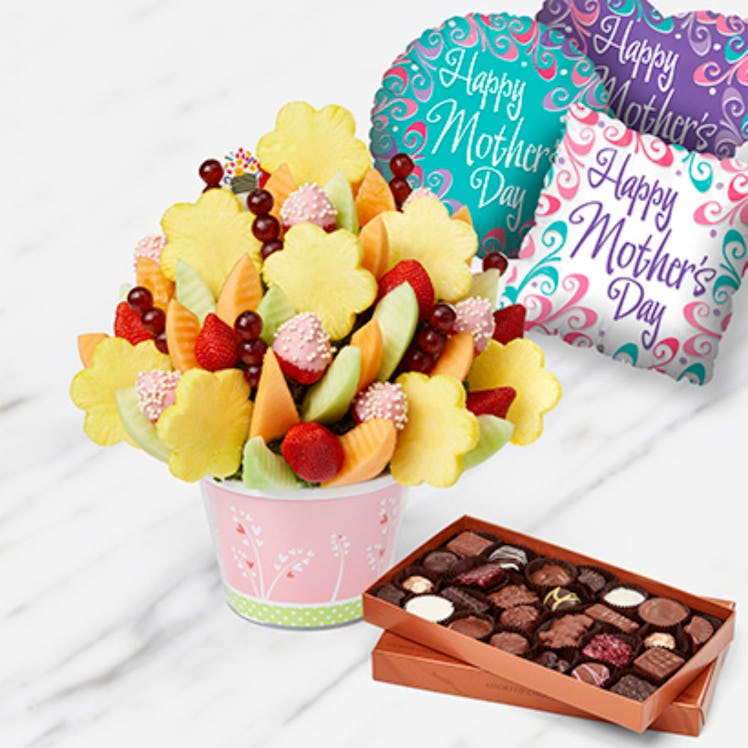
Here's How To Safely Send Edible Arrangements For Mother's Day During Quarantine
Mother's Day is fast approaching, and you might feel a little unsure about what you should give your mom during the coronavirus pandemic. If you're thinking about getting the mother figure in your life a perishable gift for their special day, you may be wondering if it's safe to send an Edible Arrangement for Mother's Day. Family celebrations won't look the same as in years past, but you can keep mom safe and still show her you care.
The worry about a food delivery during the coronavirus pandemic is two-fold: the food itself and the safety of sending a delivery at all. Thankfully, according to guidance from the Centers for Disease Control and Prevention (CDC) as of May 4, there is currently "no evidence to support transmission of COVID-19 associated with food." The virus is thought to spread through person to person contact via respiratory droplets. Rachael Piltch-Loeb, Ph.D, a preparedness fellow at Harvard University's T.H. Chan School of Public Health, tells Elite Daily, "We don't have any evidence that the virus is transmitted in the food supply."
The packaging is the other concern for food deliveries, but according to the guidance from the CDC as of May 4, it "is unlikely [for the novel coronavirus] to be spread from domestic or international mail, products or packaging." According to a study published in The New England Journal of Medicine on March 17, the novel coronavirus can be active for up to 72 hours on plastic and stainless steel, under 24 hours on cardboard, and under four hours on copper — but that doesn't mean the possible presence of the virus will result in transmission from object to person.
"If the virus was on a package you sent, whether it was sent in cardboard or plastic, it would likely break down as it traveled through unstable conditions, like the heat and cold in a truck or plane," Piltch-Loeb explains. "Edible Arrangements are typically sent and carried at low temperatures and over some duration of time." Delivery information on the Edible Arrangements website states that local deliveries are delivered in a refrigerated van, and orders sent via USPS are "packaged to ensure freshness."
According to Edible Arrangements' COVID-19 response as of March 2020, the brand is following the CDC and World Health Organization (WHO)'s guidelines for safety and sanitation procedures. The stores have implemented a higher frequency of vigorous hand-washing procedures in compliance with the guidelines and strict sanitization of food preparation equipment. In addition, all delivery vehicles are cleaned and sanitized before and after each delivery, and the drivers must sanitize their hands before and after each delivery.
When you order an Edible Arrangement, make sure you select contactless delivery, which means the package will be left at the door with no signature required. Vincent Racaniello, Ph. D, the Higgins Professor of Microbiology & Immunology at Columbia University, previously told Elite Daily that you should maintain a "heightened awareness" when receiving packages. Racaniello explained, "Everything you touch is potentially contaminated." Therefore, your mom should immediately wash her hands after touching the packaging. As an extra precaution, Racaniello says it's probably best to put the food on a clean plate and quickly discard any container it was delivered in.
With proper precautions, the delivery should be just fine. Piltch-Loeb says, "Assuming no one touches the arrangement with their bare hands, your mom should simply wash her hands before consuming whatever food you send."
If you think you’re showing symptoms of coronavirus, which include fever, shortness of breath, and cough, call your doctor before going to get tested. If you’re anxious about the virus’s spread in your community, visit the CDC for up-to-date information and resources, or seek out mental health support. You can find all Elite Daily's coverage of coronavirus here.
Experts cited:
Rachael Piltch-Loeb, Ph.D, preparedness fellow at Harvard University's T.H. Chan School of Public Health
Vincent Racaniello, Ph.D, Higgins professor of Microbiology & Immunology at Columbia University